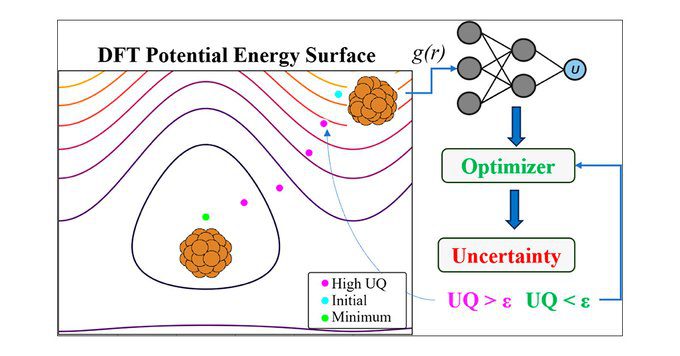Uncertainty Based Machine Learning-DFT Hybrid Framework
The integration of machine learning (ML) with density functional theory (DFT) has opened new avenues in computational chemistry, particularly in the realm of geometry optimization. The recent development of an Uncertainty Based Machine Learning-DFT Hybrid Framework aims to accelerate this process, making it more efficient and accurate. This innovative approach leverages the strengths of both ML and DFT, providing a robust solution for complex chemical computations.
DeepMind’s AlphaGeometry: A Milestone in AI for Geometry Problems
DeepMind’s latest AI system, AlphaGeometry, is a significant advancement in solving complex geometry problems. Capable of tackling Olympiad-level geometry problems with performance comparable to human gold medalists, AlphaGeometry employs a hybrid approach combining neural networks and symbolic reasoning. This breakthrough aligns with the trend of increasing AI capabilities and exploring hybrid approaches to achieve more generalizable AI. For more details, visit DeepMind’s latest AI can solve geometry problems.
IIT Guwahati’s LEAP: Optimizing Semiconductor Design
Researchers at IIT Guwahati have introduced ‘LEAP’, an advanced machine learning framework designed to optimize the design of Integrated Circuits (ICs). LEAP improves efficiency by reducing the runtime of EDA tools by 50% and decreasing the clock period by 2%, significantly benefiting the semiconductor industry. This innovation enhances electronic device performance while reducing energy consumption. For more information, visit IIT Guwahati develops LEAP.
NVIDIA’s EdgeRunner: Revolutionizing 3D Mesh Generation
NVIDIA’s EdgeRunner is poised to be a game-changer in 3D mesh generation. Its mesh tokenization method compresses sequence length by 50% and reduces long-range dependency between tokens, significantly improving training efficiency. This technology generates highly detailed 3D meshes with greater accuracy and efficiency than traditional methods, especially in challenging scenarios. For more insights, visit NVIDIA’s EdgeRunner.
Atomic Industries: AI-Powered Tool and Die Making
Atomic Industries has closed a $17M seed round to scale its AI-powered software for automating tool and die making in manufacturing. By combining AI with physics-based simulations, this software optimizes tool and die design, potentially revolutionizing manufacturing efficiency and cost. This development aligns with trends of automation and AI adoption in manufacturing. For more details, visit Atomic Industries closes $17M seed.
Related Articles
- Predicting Collective Dynamics of Multicellular Systems with Geometric Machine Learning
- Automate Machine Learning in R with FastML
- Understanding Direct Preference Optimization in AI: Revolutionizing Human-Centric Machine Learning
- Dive into the Future of Fully Homomorphic Encryption (FHE) and Artificial Intelligence (AI) with DIN
- Unleashing the Power of MetaGravity’s Hyperscale Engine on NVIDIA CPUs
Looking for Travel Inspiration?
Explore Textify’s AI membership
Need a Chart? Explore the world’s largest Charts database
